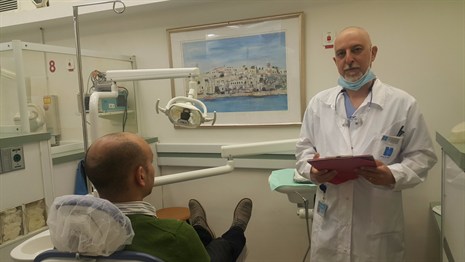
As a new arm of its Unit for Oral and Maxillofacial Radiology within the Department of Oral Medicine, Hadassah Hospital Ein Kerem has opened a multidisciplinary Center for Disorders of Taste and Smell, which will focus on accurately diagnosing these conditions and facilitating follow up with the appropriate specialists.
Prof. Doron Aframian, head of Hadassah’s Department of Oral Medicine as well as Hadassah’s School of Dental Medicine, is also director of the Center. His multidisciplinary team includes neurologists, internists, electroencephalogram (EEG) specialists, oral and maxillofacial surgeons, gastroenterology specialists, and oncologists. “Taste and smell disorders,” Prof. Aframian reports, “affect 2 percent of the general population; however, that number balloons to nearly 50 percent within the senior population (those over 65).” He adds: “While there are various potential causes for taste and smell disorders, the most common cause is nasal airway obstruction, attributed to nasal polyps. In addition, other factors may include psychiatric, neurologic, autoimmune, metabolic, endocrine or neoplastic disorders, as well as side effects from prescription drugs, surgical procedures, chemotherapy, and more.”
Taste and smell disorders, Prof. Aframian brings out, not only cause discomfort and compromise quality of life, but also limit a person’s ability to identify harmful substances. Loss of smell has led to life-threating episodes, including exposure to gas leaks, fires, and food poisoning.
Prof. Aframian notes as well that the two senses are interconnected. “Nearly 70 percent of our sense of taste is influenced by our sense of smell,” he says, and “nearly 70 percent of those who suffer from smell disorders complain of a deteriorating life style, with nearly half of them noting drastic changes in appetite and weight.”
Taste and smell disorders also may indicate an underlying condition, such as Parkinson’s disease or initial signs of a stroke. Underscoring the seriousness of these disorders, Israel’s National Insurance Institute recognizes the loss of the senses as a “handicap.”
“The moment we are able to identify the root of the disorder,” notes Prof. Aframian, “we can proceed with accurate and professional treatment.”
